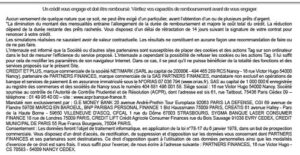In just a few minutes, we'll break down a banking law concept: the lump-sum indemnity or indemnity for immediate payment.
Lump-sum compensation: a contractually agreed penalty
Background: A bank may decide to accelerate a loan and demand immediate payment of the sums borrowed (see our article on forfeiture of the term) as a result of the borrower's default.
It knows from experience that repayment can take some time. It may even never happen if, for example, the debtor files a case for overindebtedness that results in the debt being written off.
In order to compensate for the loss resulting from the delay in settling its debt, the Bank included a clause in the general terms and conditions of its loan offer under which the borrower would have to pay an additional penalty.
The amount of this penalty is expressed as a percentage calculated on the sums due.
How do I know if the bank is claiming a fixed indemnity from me?
To determine this, you first need to refer to your loan offer and look for any stipulations that may contain such a penalty clause.
It can be found under the heading "Exigibilité anticipée" (early repayment), "Défaillance de l'emprunteur" (borrower default) or, more prosaically, "Clause pénale" (penalty clause).
After specifying that in the event of acceleration of the term, the lender may demand immediate repayment of the outstanding capital plus any accrued but unpaid interest, and that until the date of actual payment, the outstanding sums will bear interest on arrears at the legal rate for the loan, the clause then generally specifies :
" In addition, an indemnity equal to X% of the sums due (in principal and accrued interest) will be requested by the lender from the borrower. ".
This search will allow you to check the contractually agreed rate.
The next step is to examine the statement of receivables provided by the Bank and look for a line in the receivable items that usually reads "...". Indemnity 7 % provided for in the act "or Flat-rate allowance "without any further details.
Is lump-sum compensation lawful?
Under theArticle L. 313-51 of the Consumer Code :
"When the lender requests that the contract be rescinded, he may demand immediate repayment of the outstanding capital, together with payment of the interest due. Until the date of actual payment, the outstanding sums shall bear interest on arrears at a rate equal to that of the loan.
In addition, the lender may demand compensation from the defaulting borrower which, without prejudice to the application of Article 1231-5 of the Civil Code, may not exceed an amount which, depending on the remaining term of the contract, is set according to a scale determined by decree.
L'Article D. 312-16 of the Consumer Code sets this maximum amount at 8% of the outstanding capital at the date of default.
However, it is important to bear in mind that the judge has a moderating power. He can reduce the amount if he considers it to be manifestly excessive.
In a ruling handed down by the Bordeaux Court of Appeal, the lender claimed compensation for two loans of €71,103 and €17470 respectively, corresponding to 8% of the sums due in principal and accrued interest.
The loan offer made no distinction between the two loans and applied the same rate in both cases. This indemnity was naturally added to the contractual interest on the sums due.
The Bordeaux court held that " that this stipulation fixing the late payment penalty demanded by the bank on a flat-rate basis for each of the two loans, together with the contractual interest on the sums still due, constitutes a penalty clause, the amount of which is manifestly excessive. Pursuant to article 1152 paragraph 2 (old) of the Civil Code, these penalties will be reduced for each of the loans to the sum of €1. "(Bordeaux Court of Appeal, 1st Civil Division, 27 Jan. 2022, no. 19/01052).
At SOLENT AVOCATS, we always try to reduce the amount of compensation to more fairly assessed sums. In particular, if your claim has been assigned, call us!




